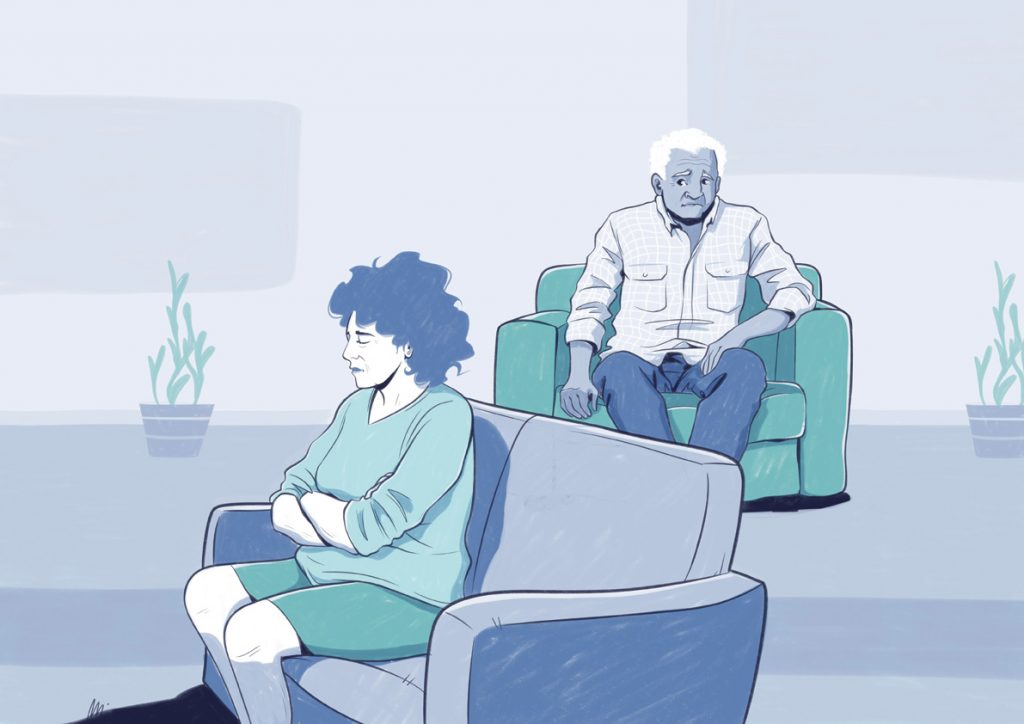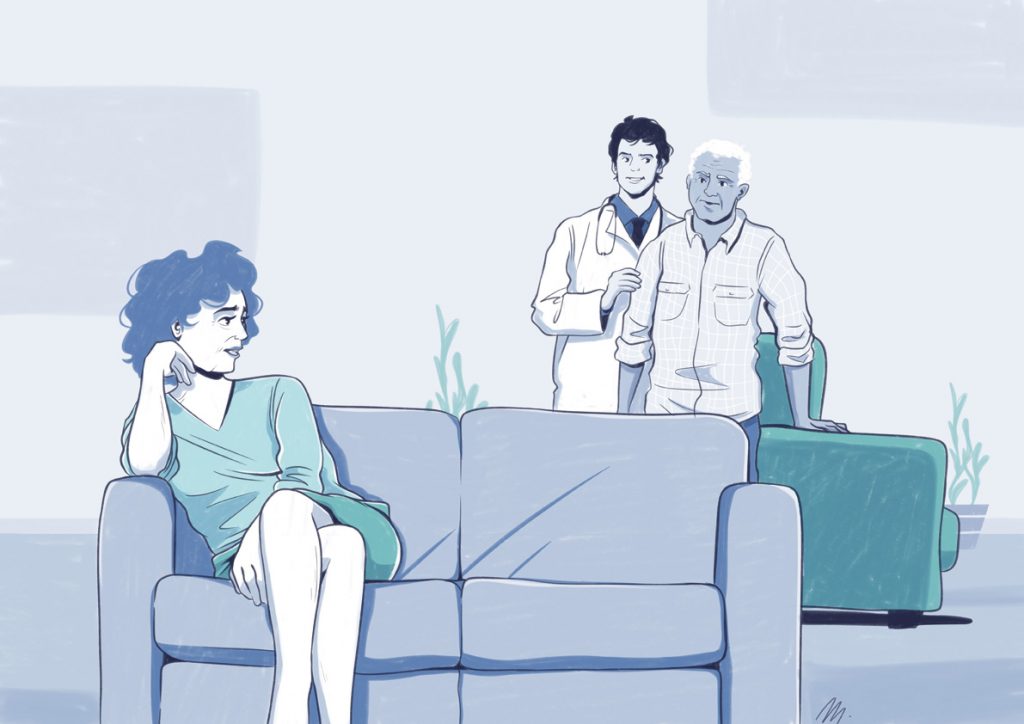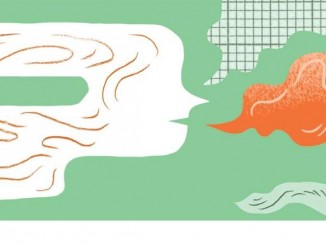Breast cancer impacts on the way a woman sees herself and on how she is seen by her partner and society in general. It’s getting easier to talk about, but are these conversations also happening in central and eastern Europe?
Pawel Walewski reports.
When Magda learned she had breast cancer, she felt it couldn’t have happened at a worse time. She was coming up to 30, and had recently parted ways with her fiancé. “My first thought was that I would lose my breast and no man would look at me ever again. I was going to forget about sex altogether.”
Magda lives in Warsaw, Poland. She was right about losing the breast – in fact she ended up having both her breasts removed. She was wrong, however, about what the loss of her breasts meant for her prospects of future relationships.
A few years on she met Peter and they got married, and started a family. Access to expert counselling allowed them to have the conversation about how he felt about her body, and helped build the mutual trust and confidence that is an essential foundation for any relationship. “I was terribly afraid that he would leave when I stopped being attractive to him,” Magda recalls, “but it turned out that it was a much smaller problem for my husband than for me.”
The issues at the heart of Magda’s story – breast cancer, body image, sexuality, self-perceptions, the perceptions of others, and how hard it can be to talk about all of this – are common to societies across Europe. Recent decades have seen an increasing interest in exploring these topics in the professional and mass media, creating a virtuous circle in which it becomes easier to conduct these conversations in private and also to advocate for improving the counselling available to cancer patients through their health services.
But how far have these changes been limited to western European cultures? Do taboos against discussing cancer or sexuality at a personal level, and assumptions about gender roles, remain more of a problem in the countries and cultures of central and eastern Europe?

Agnieszka Jagiello-Gruszfeld is an oncologist from the Cancer Centre and Institute of Oncology in Warsaw, Poland. She has no doubts that perceptions of breast cancer in the country are changing: “It used to be a larger taboo topic, so women also lived with this stigma in the family. Husbands were only responsible for the logistics: they would bring their spouses to clinics, and they would pick them up after chemotherapy, almost as if cancer was not a part of their deeper relationship.”
Today, she says, she frequently sees couples at her consultations, and stories like Magda’s are not unusual. Many women are over-fearful about the impact a mastectomy might have on their desirability and sexual relations, she says. “When couples are sitting across the desk, the male partner often reprimands his wife or fiancée: ‘What are you worried about? Don’t even think that I might be dissatisfied! Your health is the most important thing to me’.”
Mariola Kosowicz, a psycho-oncologist from the same Warsaw cancer centre, agrees with her colleague, that women sometimes fear they are being rejected, when the problem may simply be that their partner is not sure how they should respond to the struggle she is going through. She cites the example of a woman who phoned in to her live radio broadcast, who complained that, ever since she had been diagnosed with breast cancer, her husband would not even touch her.
“I asked if she had talked to him about it. The woman replied that she hadn’t. She believed that if her husband did not want to touch her, it was clear he would not change his mind. I advised her to ask him what he was afraid of. Did he feel aversion, or maybe he was just afraid to put his wife in an uncomfortable situation? Maybe he didn’t want to give an impression that he was only thinking about sex.”
“Women may fear they are being rejected when the problem may be their partner is not sure how to respond to the struggle they are going through ”
That’s not to say that such fears are never justified or rooted in reality. Kosowicz cites the case of a woman who brought her husband to a consultation to tell him that, once the surgery was over, he would no longer be able to make love to her in the position he liked best without causing her pain. When the man asked his wife why she had not said anything about this at home, recalls Kosowicz, she reminded him of the time she did not want to make love, and he told her off, saying she had to remember other women would want to. “This fear was now back.”
“This disease is a test of how couples deal with a crisis,” says Kosowicz. “If a relationship is mature and built on something more than physical attraction, one can immediately see a different bond between the partners.”
A widespread problem
How many relationships fail the test is difficult to know, but advocates across the region believe the problem is widespread.
Stanislava Otasevic is president of the breast cancer advocacy group Europa Donna, in Serbia. She says, “No statistics in this field are available, but it’s not rare that relationships become deeply damaged.”
Donjeta Zeqa, her counterpart in Albania, points out that failed relationships cannot anyway be measured simply in terms of separations and divorces. “In Albania people care about the opinions of others, and sometimes couples stay together just to not let others talk about them.”
“Typical Balkan mentality!” she adds.
Alena Kallayova, a medical professional who works with the Slovakian breast cancer patient advocacy group OZ Amazonky, says that the situation is particularly bad in the smaller towns and in rural areas. “We have information showing that many women feel ashamed of their disease, and even their closest relatives do not talk to them about it. They feel they are not a part of the local community anymore.”
Her point is echoed by Otasevic. “In my country [Serbia], women treat the disease as their fault, and they worry that they wouldn’t be attractive to their partners,” she says. “Even medical professionals diagnosed with breast cancer prefer to speak about it to their fellow females,” adds Otasevic, who has herself worked as a health professional for almost 30 years.
“Some men help their wives with housework, but only on rare occasions do they understand what the wives expect from them emotionally”
Anna Kupiecka from Warsaw understands that feeling. When she was diagnosed in her mid-40s with an aggressive breast cancer requiring a mastectomy, she felt it would be best to part ways with her partner. “Since it was so difficult for me to live without a breast, I was sure that he would not be able to bear it, and that’s why I preferred to let him go,” she says.
She believes that the image of a strong heroic woman is one many feel they should live up to, even when they have a serious illness – coping with demanding jobs, caring for their homes, raising the children, and still playing the chief caring role in relation to their partner, advising them to get screened for cancer themselves. “They won’t admit to anyone that they also cry, feel pain, or fatigue.”
Zeqa, from Albania, argues that her country’s macho culture makes it difficult for women to feel they can talk to their partners about their breast cancer. “Generally, in the Balkans, the global phenomenon of gender inequality reveals itself in highly normalised practices of domestic violence against women, rape shaming, enforced economic dependence via unequal resource distribution, and many other historical and contemporary dimensions. In this condition, women in Albania sometimes feel frightened to talk about breast cancer with the partner.”
Kallayova argues that, in Slovakia, the men often do try to help out, within the boundaries of what is seen as ‘their role’, but they often fall short when it comes to providing emotional support. “Some men help their wives with housework, such as shopping, cleaning, cooking, as they feel that they are the head of the family, but only on rare occasions do they understand what the wives expect from them emotionally and psychologically, taking active interest in their treatments,” she says.
Her point is echoed by Elena Volkova, a breast cancer survivor from Moscow, Russia. “Our men know how to support their women who have a headache, but they have no idea what to say if someone has breast cancer. People don’t know how to talk openly – what to say, and when.”
“People don’t know how to talk openly – what to say and when”
This may not be so surprising, as Otasevic from Serbia comments, because “family members do not have the opportunity to learn what their roles are, and how they should behave.”
She argues that the educational system has an important role in educating girls and boys about gender relationships, and says the church could also influence behaviours for the better if it chose to, though currently, she says, “the Church does not pay attention at all in this field.”
Zeqa says that, in Albania, Europe Donna often collaborates with churches and mosques, so that priests and imams encourage frank conversations between men and women with breast cancer. “Of course nothing can happen magically,” she agrees. “Everything needs time and hard work.”
Doctors don’t ask
Her point about time and hard work may hold as true for the culture of medicine as it does for society at large. While Magda and her partner did get the benefit of counselling many years after her diagnosis, the topic was never mentioned at the time of her treatment. She felt the focus was on saving her life, and it had seemed inappropriate for her to broach such a personal subject. Her doctors did not ask. Looking back on it, she wonders why.
Zbigniew Izdebski, from the Department of Counselling and Sexology at the University of Zielona Gora in Poland, believes the answer is obvious: “Most doctors have never been trained in sexology. They don’t know what the norm is, what to ask, or how. This topic makes them feel awkward, so if the patient does not dare to speak up, they will not be the first to raise it.”

Lack of time tends to be the reason most commonly given by doctors for failing to address this issue, says Izdebski. Oncologists have too little time to spend with each patient, and need to limit themselves to what they feel are the most important matters in order to find time for everyone. But they also feel they lack the expertise needed to offer help and advice in this area.
Investing in psychosocial care
One solution would be to invest in specialist counselling services such a psycho-oncology, which patients can access directly or by referral from their oncologist. Recent decades have seen an expansion of this specialism, but countries of eastern and central Europe are generally lagging behind, according to a 2014 survey conducted by the International Psycho-Oncology Society within the framework of the European Partnership for Action Against Cancer (Psycho-oncology 2017, 26:523–30).
Of the 27 countries for which data was supplied, 21 included psychosocial oncology care in their national cancer plan, but only five of these countries were from central and eastern Europe (Czech Republic, Estonia, Hungary, Lithuania and Slovenia). Of these, only Estonia and Slovenia reported having specific budgets for the service.
While these findings give some indication of disparities in provision of psychosocial care across Europe, they will also reflect disparities in how far such services have been formally integrated into cancer plans. The Profile article on Romanian psycho-oncologist Csaba Dégi in this issue of Cancer World, ‘Playing catch-up with the West’, gives some insight into the obstacles to making progress on this front.
“The network of psychological advisers is weak, old fashioned, and not up to the job… Women don’t find the support they need”
There are also issues of quality. The same survey indicated that, of the eight countries that reported having published or nationally recommended guidelines covering psychosocial oncological care, none were from eastern or central Europe. A separate study conducted five years earlier had found that only seven countries in Europe recognised the need to improve their psychosocial oncology care, and had a method for evaluating the plan, its objectives and outcomes, of which Estonia was the only one from central or eastern Europe (Psycho-Oncology 2012, 21:1027–33).
The absence of guidelines and quality control is likely to translate into substandard services. Otasevic comments, for instance, that in Serbia, the network of psychological advisers is weak, old fashioned, and not up to the job. “Women don’t find the support they need,” she says.
Elena Volkova, treated for breast cancer in Moscow, gives an equally scathing account of the quality of psychological ‘support’ she received. “The psycho-oncologists we have in the clinics are not very good. I tried to speak with some of them and they were not interested in patients. They just say everyday phrases like: ‘How do you feel now, calm down, everything happened already, you just need to think about your family, your kids, your life… and so on’. They speak in that way, as if you are going to die. They don’t believe you can live a happy and long life after cancer. This is the main problem. I think that only when a woman believes in herself, can she be happy with her partner.”
I’m a partner, what can I do?
Bartosz Polinski spends a lot of time advising men on how they can talk to their partners who’ve been diagnosed with breast cancer, so they can better share the monumental task of learning about the disease and the treatment options, and navigating through the Polish cancer care system.
Bartosz is not a psychologist. He’s an IT specialist who took up the cause of his sister Agata, after she was diagnosed with breast cancer aged 27, and her boyfriend at the time left her. (Ironically her boyfriend was a psychologist. “Today it might amuse me, but back then I was not happy,” she says.)
Using his professional experience in managing complex projects, Bartosz threw himself into the task: searching Google for credible information; reading and summarising clinical reports, which Agata herself found too stressful to do by herself; seeking expert second opinions; accompanying his sister to consultations; and disarming the proverbial ‘bombs’ that he says the Polish oncological care system would throw at them.
The partnership almost fell apart, however, over differences about what they were trying to achieve. For Bartosz, maximising his sister’s chances of survival was all that mattered, while Agata placed a high premium on avoiding a mastectomy, and insisted that her brother could not advocate for her unless he backed up her priorities, “Because this is a problem that concerns my body.”
Today, Bartosz and Agata jointly run Alivia, a Polish foundation that seeks to educate cancer patients and give them the tools and means to make decisions regarding their own health, based on reliable information.
The foundation, and especially Bartosz himself, frequently receives calls from men seeking information about how to care for partners diagnosed with breast cancer. They often feel embarrassed, says Bartosz, asking whether it is fair for them to disturb the wall of privacy their partner hides behind. But these guys, says Bartosz, are just like him: task-oriented, with a managerial approach to life. “If something has to be taken care of, they want to be the first to do it.”





Leave a Reply